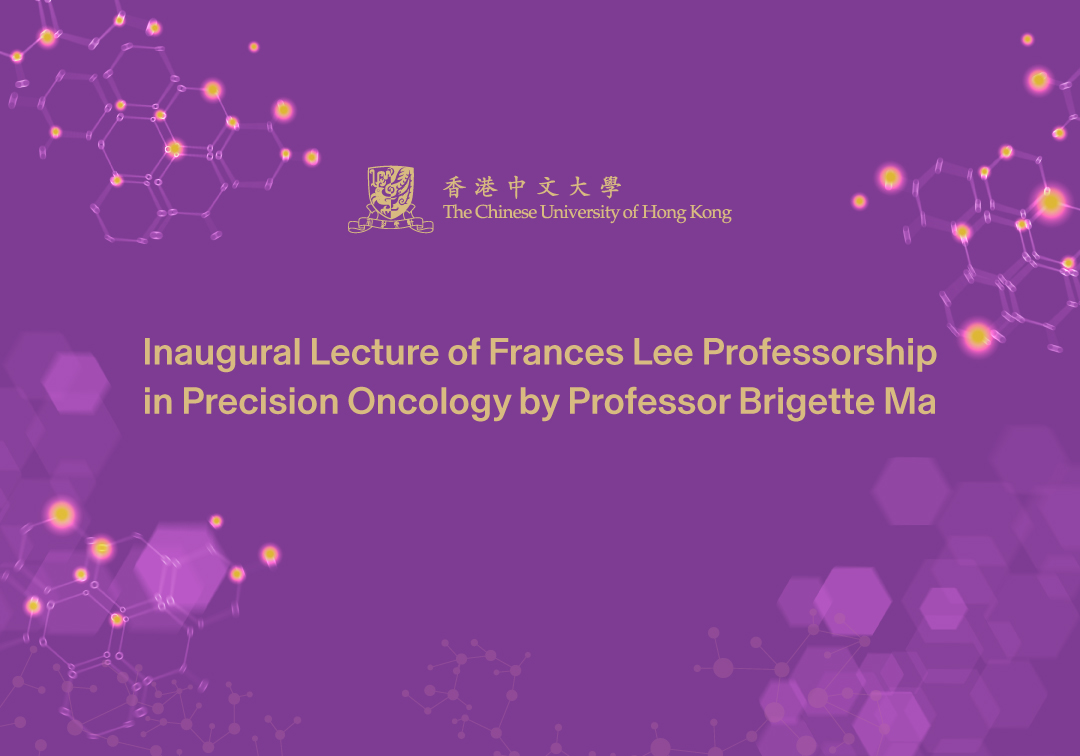活動
Inaugural Lecture of Frances Lee Professorship in Precision Oncology by Professor Brigette Ma
2025年5月6日
5:00-6:00pm
Shaw College Lecture Theatre, The Chinese University of Hong Kong
Professor Brigette Ma
Register here by 10 April 2025
seep@cuhk.edu.hk
4:30pm Guest registration
5:00pm Lecture commences
6:00pm Lecture concludes
Title: A tribute to space and time – a doctor who had once aspired to be an architect
Title: 向時間和空間致敬: 一位曾經立志成為建築師的醫生
The Chinese American architect I.M. Pei (貝聿銘) once wrote, ‘The essence of architecture is form and space, and light is the essential element to the key to architectural design…technology and materials are secondary’. Block form, Bay window and Scissor Stairs are not mere architectural terms – they are creative solutions intended to enrich the lives of the people that architects serve.
The Pulitzer Prize Winner Dr. S. Mukherjee once wrote, ‘Cancer is the Emperor of All Maladies’. The essence of cancer is mutability and heterogeneity, and time is the most important commodity to people afflicted with cancer. Both research and compassion are the foundations of Oncology. Chemotherapy, targeted therapy and immunotherapy are not mere medical terms – they are desperate solutions intended to extend the lives of the people that doctors serve.
The work of architects and doctors may seem worlds apart, but in reality, their professional duty resolves around the common goal of tailoring the best possible solution to people with special needs. The doctor-patient relationship is analogous to that of the architect and client – a framework built on trust. In oncology, these special needs reach a Herculean scale when one has to grapple with over a million people dying from bowel cancer and over 80,000 people losing their lives to nasopharyngeal cancer annually worldwide. These problems need solutions with impact on a substantial scale, translating scientific discoveries from laboratories to clinics through the relentless conduct of clinical trials and experimentation. The journey of discovering new drugs and biomarkers for precision oncology is an arduous race against time and a test of resilience for those who dare to challenge existing paradigms. This quest takes grit and cannot succeed without the altruism of countless patients who volunteered in clinical trials, and the leadership of visionaries who find creative solutions to old problems and break new grounds.
Standing at a crossroad 30 years ago, a young woman left her dream of making her mark with space and light through architecture, and instead followed the footsteps of her forebears in medicine. An unforeseen turn of event inextricably drove her into the field of medical oncology. Supported by her loved ones and inspired by the vision and guidance of generous mentors across the continents, this young oncologist embarked on a journey of cancer research spanning two decades. Over the years she and her team have helped bringing innovative phase 1 clinical trials of new anti-cancer therapies to patients in Hong Kong, expanding treatment options by bringing new immunotherapy and multi-modal therapies for patients with nasopharyngeal cancer. She and her colleagues have built an award-winning multi-disciplinary cancer management team for patients with colorectal cancer, changed the treatment paradigm of metastatic colorectal cancer worldwide by promoting the practice of precision medicine, and establishing treatment guidelines with international oncology societies. Over the years, her journey as an oncologist has taken on a personal dimension, where she has the privilege of guiding some truly exceptional individuals and their families throughout their cancer journeys. Their courage and dignity in face of adversity are the fuel that has sustained her determination in cancer research against all odds, in the hope that their altruism and suffering would not be in vain. In her quest of finding solutions to counteract the mutable and heterogeneous nature of cancer, like an architect, she has turned to searching for forms in space. She and her colleagues are exploring the 2- dimensional ‘space’ or microenvironment of nasopharyngeal cancers using advanced multi-omic spatial analytical platforms. It is hoped that this research may help to bring precision in selecting patients for immunotherapy.
Everything in life comes back in full circle. This woman now standing in front of you on this podium who was at a crossroad 30 years ago, has found her calling in cancer research and guiding patients through numerous battles against cancer. But my desire for finding meaning through space and light has not diminished. As I stood at the Southwestern balcony of the Yasumoto International Academic Park while watching the last rays of sunset, a moment of transcendence came upon me. I can see the light in the form of faces, the kind faces of all those who have shaped who I am today.


